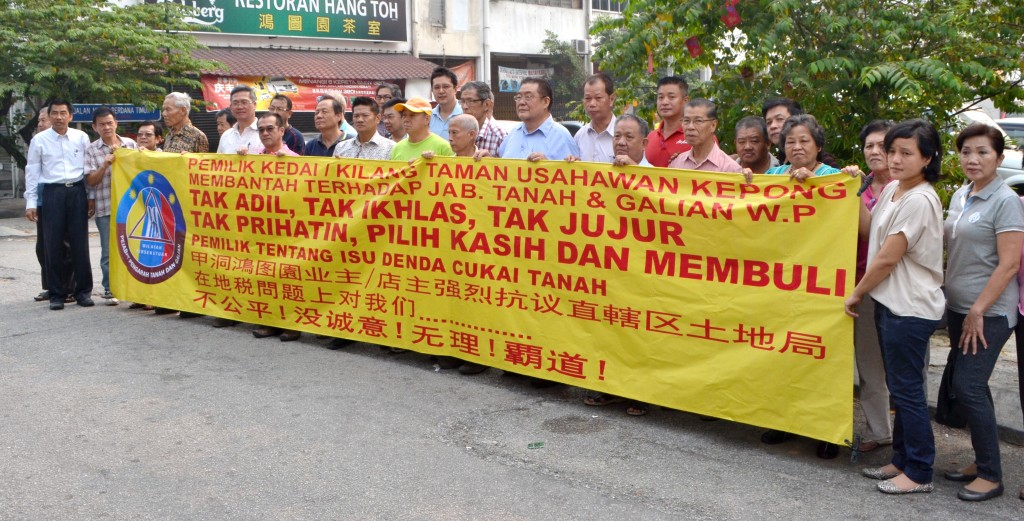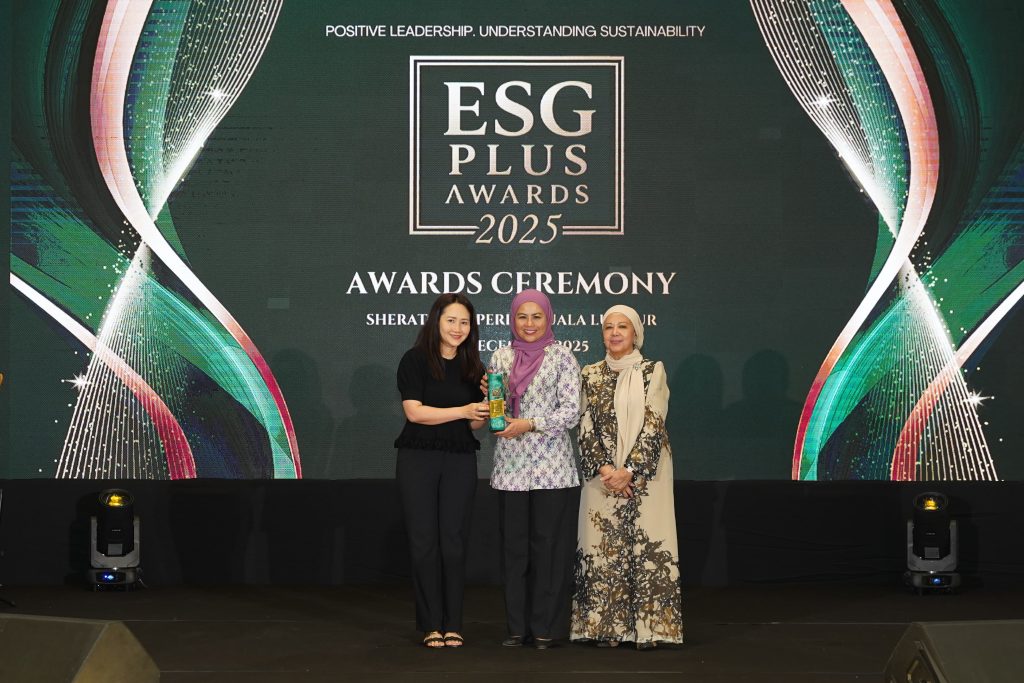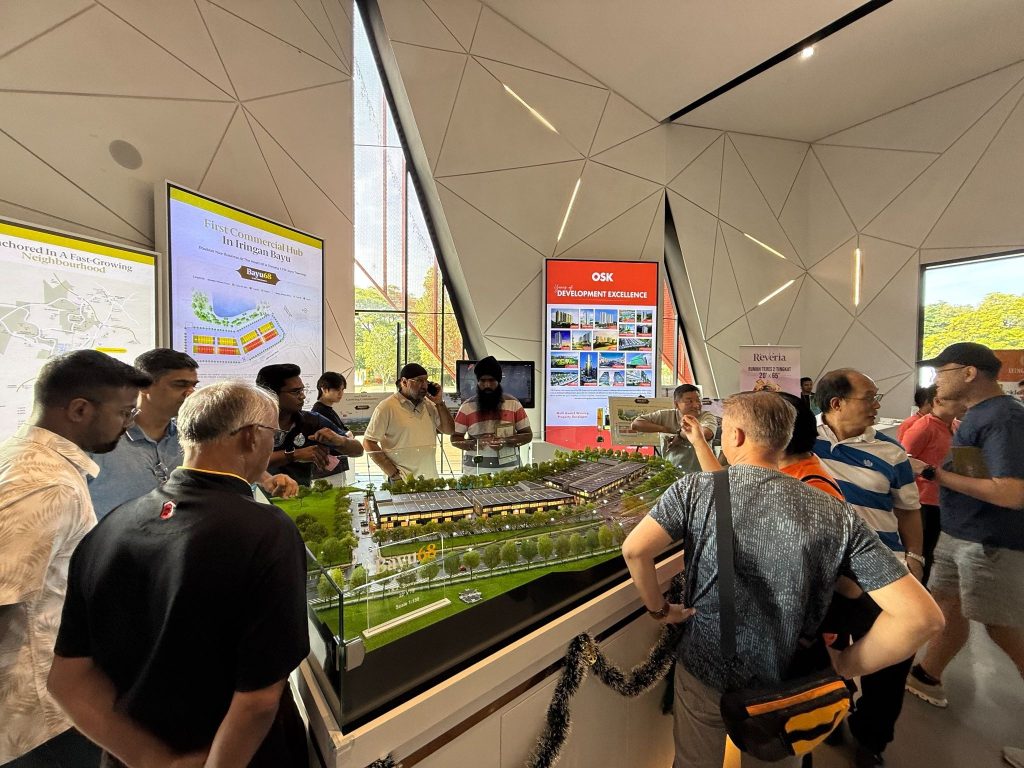Contributed by property valuer Mary Lau
A harrowing tale about a legal battle between a group of strata property owners and an unscrupulous developer
The details and complexities of this case would fill a book – but the specifics have been omitted to ensure the anonymity of the parties involved. This article is a summary of essential points to give owners in similar situations some guidance in their choice of action to take.
It has been 16 years and it is still not over. It began as a group lawsuit against the developer of a condominium in Sarawak for the non-delivery of strata titles. It had been many years since the handover. Our building was poorly managed, accounts not forthcoming, and expenses questionable. Without the titles, the developer would remain in charge and the owners' interests left unprotected.

A familiar predicament: In 2014, the owners of units at the Happy Court apartments in Taman Kepong appealed to the Kuala Lumpur Federal Territory Department of Lands and Mines (JKPTGWPKL) regarding the non-delivery of their strata titles, despite waiting over two decades and having paid outstanding quit rent on behalf of the now-defunct developer.
Sarawak is not governed by the Strata Management Act 2013 (SMA) as in West Malaysia for strata title buildings. It is under the Strata Title Ordinance 1995 (STO), which unlike the SMA, is silent on Annual General Meetings and the provision of audited accounts to owners before the issuance of titles and the formation of a Management Corporation (MC). The STO does not provide for a Joint Management Body (JMB) during the interim period as the SMA does.
The lack of protection during this period is a fertile ground for abuse by unscrupulous developers. It is to their advantage to delay the delivery of titles.

Without the strata titles, owners can be held to ransom by unscrupulous developers profiteering from service and maintenance charges, misappropriating sinking fund money, and providing sub par services. Photo by Philip Veater on Unsplash
Getting our titles
When we began approaching other owners in 2003, half of them agreed to join the lawsuit. Those who did not participate had their reasons: lack of funds, fear of retribution, a few were suspicious of our agenda, and a few others were on friendly terms with the developer. An enemy from within was one of our obstacles throughout the years – one of the owners fed information to the developer. Being at the forefront, the threat of gangsters was a nagging concern and I was worried about our safety.
Our lawyer, who we appointed in 2004, advised that we go for summary judgement. This is a judgement entered by a court for one party and against another party without having to go through a lengthy trial. It is used when the facts of the case are strong and indisputable. Both parties can move for this judgement. Our case qualified to take this route.
A registered association (ASCT) was formed with one of us as chairman in 2005 to represent the lawsuit. The members were the owners who took part. Within ASCT, there was a core group which was instrumental in keeping things together by the unwavering commitment of their members. Without this stronghold, we would not advise anyone to do this as it can be a costly and arduous journey.
In 2007, the judge ruled in our favour. We were considered very fortunate to have won so quickly. We had a very experienced lawyer. However, winning on paper was one thing, getting the titles required our lawyer to do more work and that meant more legal fees. It would take another six years before we got our strata titles in 2013. The delay was apparently because the developer took their time to fulfil a certain requirement. They were the bottleneck.
The pursuit of misappropriated funds
In 2010, an owner in the ASCT’s core group engaged a lawyer on her own initiative to recover the funds misappropriated by the developer. In 2012, spurred on by the team’s enthusiasm, the ASCT took over the suit. We wanted our first lawyer to concentrate on getting the titles and a different lawyer was engaged to handle the recovery of misappropriated funds.
The main amount includes RM2.3 million as service charges (SVC) taken and RM1.2 million as developer’s arrears of SVC. In addition, there were unjustifiable expenses such as high monthly secondment fees paid to the developer’s personal company and high property managing agency costs. We estimated the total amount to be over RM4 million. It was a real cause for concern.
On our end, we held back part payment of the monthly service charges for our units as we felt that it was pointless to pay into a bucket with a hole. We planned to pay all the monies to the management after the Management Corporation was formed – when the developer would be out of the picture. Technically, that made us defaulters and the developer used that to counter the suit even after we paid every cent of the outstanding amount to the MC. The developer demanded that the amount be paid to them.
In 2013, our strata titles came out and the first AGM was held that year. The developer had been managing the building and their tenure would end with the formation of the Management Corporation (MC).
At the AGM, the developer employed a team of RELA officers to block the ASCT’s core team from entering the meeting hall. Armed with the provisions of the law and the strata book in hand, our lawyer, who accompanied us, demanded that they let us participate and we got in.
A commotion broke out when the AGM started a discussion on who would chair the meeting. The developer wanted their people and we wanted ours. By agreement of the floor, an owner in the ASCT’s core team was nominated to chair. He was also voted through to be the chairman of the first MC of our condo. The developer tried to take control of the MC through the owners who were on friendly terms with them but did not succeed. This was a major milestone for us to be in charge of our building after so many years.
With the first MC formed, our lawyer advised that the MC should take over the lawsuit but they were worried that it would drain the funds. Then came the suggestion that the ASCT should be its representative to continue the suit. The decision was put to vote. With seven MC members and a vote of four in support, the ASCT was recognized as the official representative in the lawsuit.
By 2014, the suit was still not making significant progress. It was more complicated than the first one but soon there would be a turn of events. When the MC was formed at the end of 2013, the developer had to hand over all the accounts. Previously, we were only allowed to inspect the accounts at the management’s office and not all accounts were made available.
With the full set of accounts, we hired an accountant in 2014 to do a forensic audit. There was solid proof of the monies taken and owed.
In 2015, our lawyer proposed a settlement to the developer based on the forensic report. They rejected it – a common tactic used to drag out a case for as long as possible until the other side gets worn out.
Since this was an obvious criminal breach of trust (CBT), our lawyer proposed that we handed over the case to the criminal authorities in West Malaysia. The monies taken were traced to a bank account here on the peninsula. Since the transaction occurred here, it came under the West Malaysian jurisdiction. This would save the ASCT further legal fees as the suit could go on for many years. Even if we won, the developer could declare bankruptcy and we would not get anything. The MC agreed and with a letter of consent, we filed a police report at the end of 2015.
Facing the authorities
In 2016, after reviewing the documents sent, a crime unit arranged a meeting between us and the developer in Selangor. In the presence of an officer, and with all the evidence laid out, all their table banging could not make a difference. The developer admitted to receiving the funds and revealed that they had spent the money in ways other than those allowed for the management and maintenance of the building – on expenses which should have been borne by themselves – such as for the payment of fines to the government for facilities encroaching on state land. They tried to justify the spending but it was obvious that those expenses were not allowed to be charged to the management.
At the time of this writing, the authorities are progressing towards the end of this case. There was a delay in between which we are not able to disclose what happened. It is our hope that the Deputy Public Prosecutor will proceed to press charges and deliver justice soon.
We are deeply grateful to our core team of owners, one of whom is the daughter of a former state minister and member of parliament, for their relentless drive and support. Through the years, we have all forged a strong bond with one another over a common cause.
About the contributor
Mary Lau graduated from the University of Reading, England, with a BSc Land Management (Valuation Specialisation) in 1991. In 2002, she was appointed High Court Assessor in Sarawak for compulsory acquisition and compensation cases and sat on the bench with the judge. She began her training with CH Williams and later held senior positions in valuation firms such as Henry Butcher, City Valuers and was a Director at Hasmi and Associates in 1999. She began her own setups in real estate investment and other ventures by 2007. She is a licenced valuer with the Board of Valuers in Malaysia.
Disclaimer
This article is intended to convey general information only. It does not constitute advice for your specific needs. This article cannot disclose all of the risks and other factors necessary to evaluate a particular situation. Any interested party should study each situation carefully. You should seek and obtain independent professional advice for your specific needs and situation.
Read another contribution from Mary Lau, “Urban regeneration: Is legislation needed?" here.
Stay informed and subscribe to the StarProperty.my Monthly Newsletter here.













































